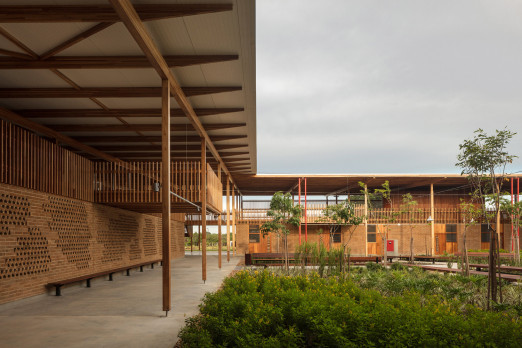There was a lot going on at COP26, so we don’t blame you if you missed some of the key launches and industry accords. While Glasgow took the main stage, we hosted the World of Wood Festival in London – a platform for exploring the role of timber in averting climate change, decarbonising construction, and supporting social, environmental and economic growth.
Here we highlight and break down two timber manifestos that were launched by the Timber Trade Federation at COP26 and the World of Wood Festival in November 2021 – with the aim of actively uniting the global construction industry in support of sustainable supply chains and a bio-based circular economy. You can download the full manifestos at the bottom of this page.
Tropical Timber Accord: Global Forests need Global Governance
The Tropical Timber Accord is a major new proposal to tackle illegal deforestation and strengthen legal governance frameworks in tropical forest producer countries and within international timber supply chains.
Billed as a “call to action” from the global private sector involved in forest management and timber production, the Tropical Timber Accord – “Global Forest need Global Governance” highlights that strong, inclusive legal frameworks are essential for the sustainable management of tropical forests and that this underpins all other climate policy ambitions.
The objectives:
- Effective governance and legal compliance throughout forest supply chains and within international trade networks to deliver positive outcomes for the future of forests
- National multi-stakeholder processes bringing together government, civil society and the private sector to formulate national laws and standards, ensuring fairness and legitimacy, as well as credibility and enforceability
- Incentivisation of effective tropical forest governance and responsible forest trade through support and encouraging foreign direct investment in added-value tropical forest industries
- International business and consumer markets to commit to sourcing from only legal sources
- Simplification, rationalisation and harmonisation of tropical forest legality and sustainability product standards and communication
- The ambition and policies framed by governments for the International Tropical Timber Agreement (ITTA) and FLEGT to be refreshed and updated
Growing our Low-Carbon Future: Time for Timber
Time for Timber is a call to action for political leaders and policy makers in every country to recognise forests, and the global wood and forest industries, as major components of a more climate-resilient economy.
Policy recommendations:
- Embed mandatory lifecycle assessments and embodied carbon thresholds within local and national building plans.
- Increase the use of wood within new build and renovation.
- Drive the growth of the bio-based circular economy through sustainable public procurement.
- Facilitate resource efficient use of wood and wood recycling, especially collection and sorting in municipalities, and develop measures to gain access to post-consumer wood, an invaluable secondary raw material resource.
- Increase training to upskill workers and create new jobs to boost the development of a sustainable and circular bioeconomy.
It advocates that wood must be adopted more widely in the global built environment. The potential climate impacts of using more wood and wood-based materials are immense: they offer solutions based on existing business models and proven technology which simultaneously store carbon and substitute fossil resources and thus can diminish the CO2 emissions caused by the global building stock.
The World of Wood Festival was devised and coordinated by the UK Timber Trade Federation and CEI-Bois, representing European woodworking industries; the team has created an alliance of over 40 separate associations, organisations, businesses and campaigns representing global forest growth and development, mass timber and wood-based products from Indonesia to Ghana, Australia, North America and China.
This initiative is also supported by UK Aid, under the UK Foreign, Commonwealth & Development Office’s FGMC programme (Forest Governance, Markets and Climate).








